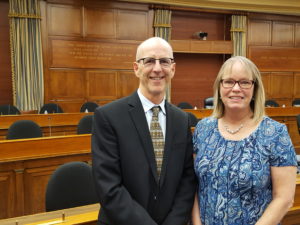The i6 Challenge award sets aim on enhancing Long Island Bioscience Ecosystem
The Center for Biotechnology at Stony Brook University has announced that is has received a three-year, $500,000 U.S. Department of Commerce i6 Challenge Investment. The award will support the Center for Biotechnology’s (CFB) efforts to bolster the regional bioscience ecosystem by supporting a formal mentorship program, as well as a critical NIH-focused SBIR/STTR training and application development program which will assist in capital formation and launching new companies.
The Center for Biotechnology is among 35 organizations — including nonprofits, institutions of higher education, and entrepreneurship-focused organizations — from 19 states that will receive nearly $15 million to create and expand cluster-focused, proof-of-concept and commercialization programs, and early-stage seed capital funds through the Economic Development Administration’s (EDA) Regional Innovation Strategies (RIS) program. The Office of Innovation and Entrepreneurship (OIE), housed within the U.S. Department of Commerce’s Economic Development Administration (EDA), leads the Regional Innovation Strategies Program to spur innovation capacity-building activities in regions across the nation.
“Long Island’s innovation economy is rooted in cutting-edge basic and applied science and engineering, fostered by top-tier research institutions, a highly educated population, and a depth, breadth and scope of intellectual capital.” said Dr. Clinton T. Rubin, Director, Center for Biotechnology. Dr. Rubin continued, “This award and the initiatives it will support add to the growing, concentrated efforts the Center for Biotechnology, the Long Island Bioscience Hub and the hub’s partner institutions are making to grow the high technology innovations born in our region into fully realized ventures.”
The Center for Biotechnology (CFB) at Stony Brook University is an Empire State Development Division of Science, Technology and Innovation (NYSTAR) Center for Advanced Technology. Established in 1983, the CFB’s efforts are focused on accelerating the development of biomedical technologies in order to have a positive impact on human health and society. The CFB is also the lead administrative institution for the Long Island Bioscience Hub (LIBH) an NIH-designated Research Evaluation and Commercialization Hub (REACH) established with a National Institutes of Health grant in 2015. The initiatives under the i6 Challenge award will complement the efforts of the LIBH, a partnership between the Center for Biotechnology, Stony Brook University, Cold Spring Harbor Laboratory, Brookhaven National Laboratory and the Feinstein Institute for Medical Research, to commercialize biomedical innovations emerging from the partner institutions.
Download a PDF of the press release here.
Related Articles:
Schumer: Biz-Development Funds Big Deal For SBU – Innovate Long Island
Stony Brook Biotech Center Wins $500,000 to Foster Companies – Newsday
